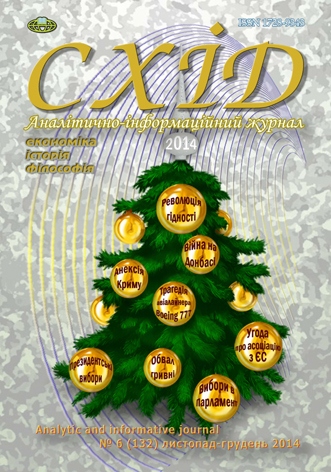Conceptualization of a mentally ill person subject in anti-psychiatry
DOI:
https://doi.org/10.21847/1728-9343.2014.6(132).36504Keywords:
subject, anti-psychiatry, existentia, phenomenology, consciousness, madnessAbstract
Рurpose of the article is focused on the study of subject conception dimensions in anti-psychiatry from the existential viewpoint, which answers the actual questions about mental disease origin; may be used as the certain methodology of psychology and pathology. It has been proved that the classical psychiatry provides the wrong conception about internal world of schizoid. It has been shown that the existential phenomenology is the only possible cognition technique for study of subject personality. The way of being of human world including the mad one as the structure of the relationship which the person creates himself is identified there in the article. On the assumption of this unity it is possible to consider mental disorders as an extreme degree of inauthenticity, remoteness from the free-transcending, when probabilistic nature of existence is not apparent, and statically complete worlds are created. It has been shown that despite of amorality and asociality of mad subject behavior it serves as anthropological abyss manifestation, which may open up for everyone in certain circumstances.
It is emphasized that the ethics of psychiatric treatment is often a denial of political freedom and subjective dignityethics.
R. Leing concept of the ontological certainty and uncertainty of the personalityis explored. An alternativity position in which mental illness is a process of healing, whereas normality - a betrayal of the true capacity of the subject is considered.
It is found that social anthropology of disease, which has formed within antypsychiatry, is shown as a connecting link, a leading component of humanistic discourse. It improves the success of existential-phenomenological psychiatry and lays the foundation for building a socio-cultural interpretation of illness.Downloads
References
Kosilova E. (2011), Anti-psychiatry: the triumph of irrationality or the human rights movement in psychiatry?, available at: http://postnauka.ru/longreads/84 (rus).
Laing R. D. (1995), Broken the "I", Saint Petersburg, 352 p. (rus).
Romek E. (2005), Psychotherapy: the birth of science and profession, Rostov-on-Don, 392 p. (rus).
Szasz Thomas (2010), The myth of mental illness, Moscow, 421 p. (rus).
Szasz Thomas (2008), Debunking Anti-psychiatry: Laing, Law and Largactil, Current Psychology, Vol. 27, Issue 2, рр. 89-101 (engl).
Cooper D. (1967), Psychiatry and Anti-psychiatry, Paladin, London, 280 р. (engl).
Downloads
Published
How to Cite
Issue
Section
License
Copyright (c) 2015 Violeta Skyrtach

This work is licensed under a Creative Commons Attribution-NonCommercial-NoDerivatives 4.0 International License.
1. Authors bear responsibility for the accuracy of facts, quotations, numbers and names used.
2. Manuscripts are not sent back.
3. The publisher does not always agree with the authors' opinion.
4. The authors reserve the right to authorship of the work and pass the first publication right of this work to the journal under the terms of a Creative Commons Attribution-NonCommercial-NoDerivatives 4.0 International License. This license allows others to distribute (copy) the published work for non-commercial purposes, provided there is mandatory attribution to its authors and a link to the first publication in our journal.
5. The authors have the right to conclude separate supplement agreements that relate to non-exclusive work distribution in the form in which it has been published by the journal (for example, to upload the work to the online storage of the journal or publish it as part of a monograph), provided that the reference to the first publication of the work in this journal is included.

